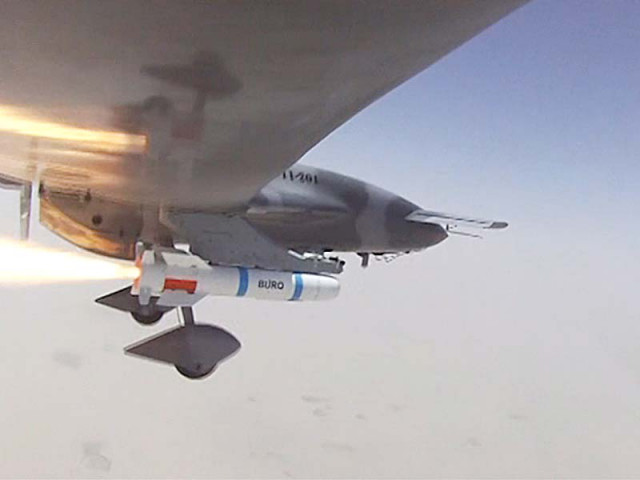Feather in the cap: Pakistan successfully tests armed drone
ucav ‘Burraq’ will add to existing anti-terror capability, says Army Chief

This television screen grab shows UCAV Burraq launching the laser-guided missile Burq.
Pakistan successfully launched a laser-guided missile from an indigenously-developed armed drone on Friday, the military said, taking it a step closer to acquiring the technology it has long demanded from the United States.
The tests of the drone, called Burraq, and the missile, called Burq, on stationary and moving targets were watched by army chief General Raheel Sharif, the director general of the Inter-Services Public Relations (ISPR), Maj Gen Asim Salim Bajwa, said on micro-blogging website Twitter.
The all-weather drone and laser-guided missile have impressive pinpoint accuracy which multiplies capability against terrorists, Maj Gen Bajwa tweeted.
The army chief commended the engineers and scientists involved in the development of the armed drone for their untiring efforts to acquire the state-of-the-art technology. “It is a great national achievement,” Gen Raheel said, adding that it would help in the country’s anti-terror campaign.
The test of Burraq came days after Pakistan conducted a successful test launch of Shaheen-III surface-to-surface ballistic missile capable of carrying nuclear and conventional warheads to as far as 2,750 kilometres.
Defence experts say the armed drone will help in the fight against terrorism.
Air Marshal (retd) Shahid Lateef said that earlier Pakistan possessed only UAVs (Unmanned Aerial Vehicles) which were for surveillance purposes only and came with their own disadvantages. “The time lag between information received via UAV surveillance and action by forces was delayed,” he told The Express Tribune.
“Burraq is Pakistan’s first Unmanned Combat Aerial Vehicle, a wholly indigenous aircraft equipped with armed missiles, resulting in the capability to immediately strike a target. This improvement is cost-effective and extremely time efficient,” he said.
“The biggest challenge was mounting the weapons which local experts have perfected after years of research and experimentation. We have finally entered that domain, and Pakistan is the 8th nation in the world to have this technology,” he added.
Another defence expert said the successful test of an armed drone was certainly a great achievement in terms of technological advancement. “Credit goes to our military industrial complex for achieving this milestone despite our overall weak industrial base,” Lt-Gen (retd) Talat Masood, former chairman of the Pakistan Ordnance Factory Wah, told The Express Tribune.
“The drone technology will give added advantage in terms of fighting terrorism. But we have to acquire other supportive technologies in order to ensure the optimal utilisation of armed drones,” he added.
The United States has run a controversial drone programme against militant hideouts in the militant-infested tribal belt of Pakistan since 2004. Pakistan publicly opposes the missile strikes by US drones, terming them a violation of its territorial sovereignty and has long asked the US to give them the technology required to run their own programme.
According to the independent Bureau of Investigative Journalism, the CIA has carried out 413 drone strikes in Pakistan since 2004, frequently prompting public protest from the government and civil groups.
Published in The Express Tribune, March 14th, 2015.



















COMMENTS
Comments are moderated and generally will be posted if they are on-topic and not abusive.
For more information, please see our Comments FAQ